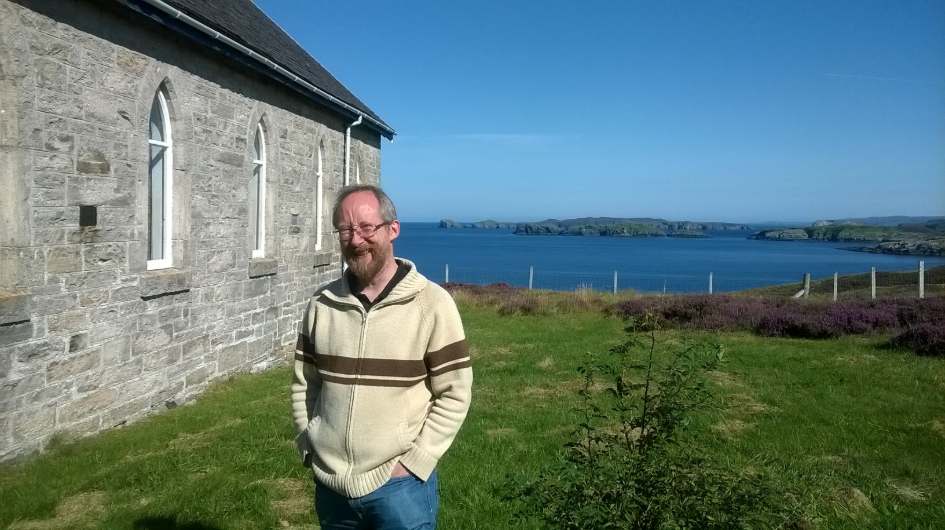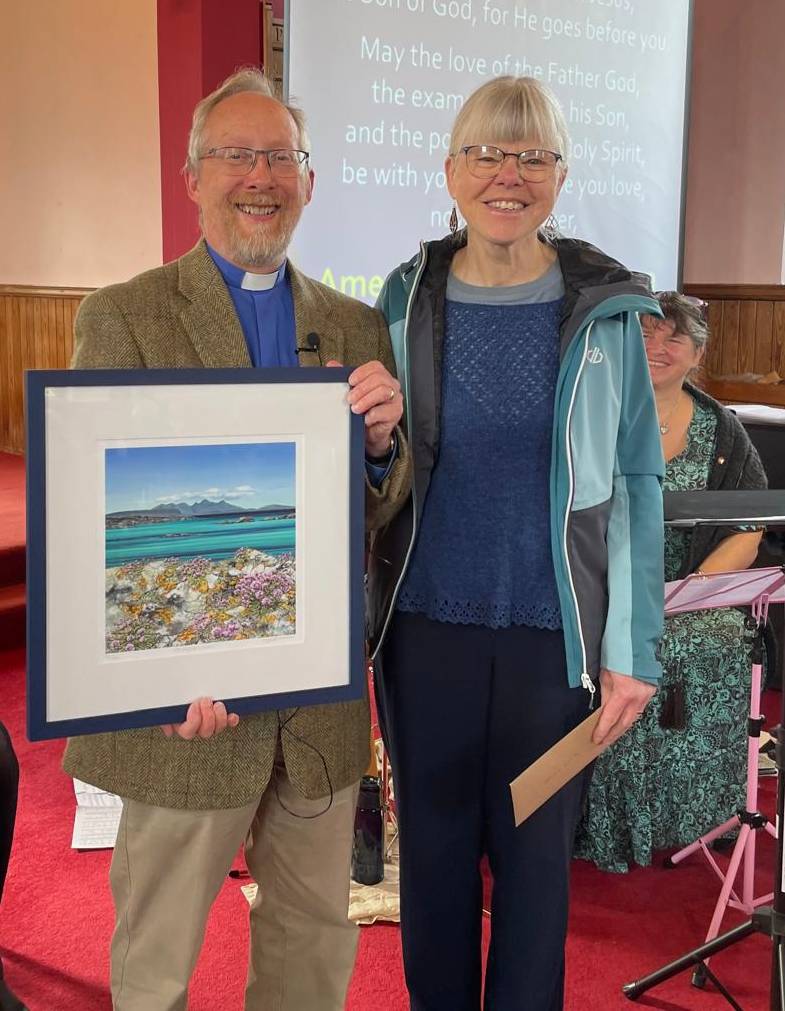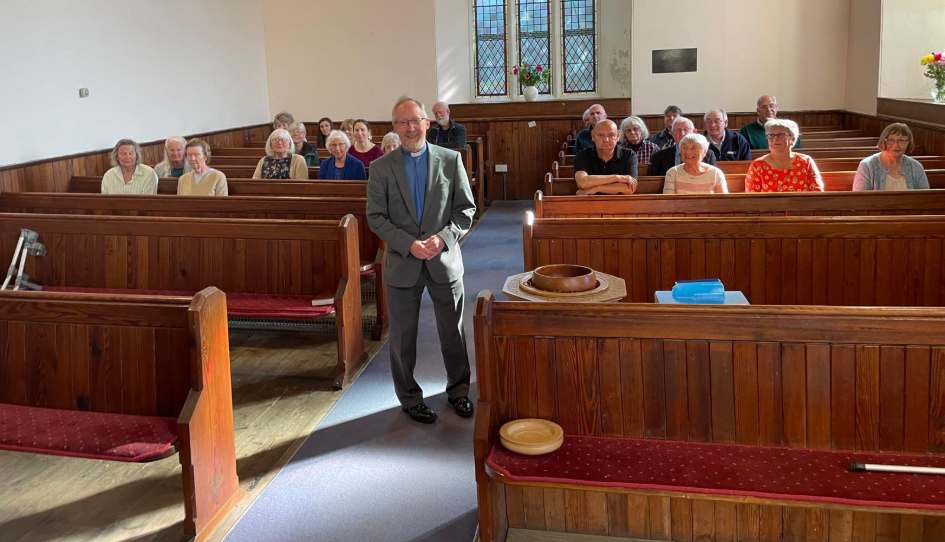February 2025: Rev Stewart Goudie
The Church of Scotland's Talking Ministry monthly series shares personal stories from those serving in Christian ministry, along with resources filled with questions, prayers and reflections to help encourage reflection on how God might be calling you at this time
For February, former engineer Rev Stewart Goudie talks about why he changed careers and left his home city for parish life in the Highlands.
My Ministry: Rev Stewart Goudie
Rev Stewart Goudie was ordained as a Minister of Word and Sacrament in 2010. After serving as minister of Melness, Tongue and Skerray for eight years, he went on to spend six years as minister of North West Lochaber before retiring to his home city of Edinburgh last year. Married to Liz, the couple have three children and three grandsons, aged eight, five and one.
What prompted you to change career from engineer to minister?

I grew up in Liberton Kirk in Edinburgh. My dad was an elder, my mother sang in the choir and my grandfather was the organist. I always said that I didn't want to be either a minister or a teacher, but then God put me in that position.
I was an electronics design engineer for 25 years. Then, towards the end of a job, I decided it was time to go somewhere else and put in my resignation. At the same time, I heard that the Church was looking for people to become ministers. I'd been an elder for about 20 years at that point and my wife and I decided that I would give it a try.
People used to ask why I wanted to be a minister and I would say: ‘I don't. I want to be an electronics engineer!
People used to ask why I wanted to be a minister and I would say: ‘I don't. I want to be an electronics engineer!'
But I felt God had called me and the bits of eldership that I enjoyed most – pastoral work, trying to build the church, leading Bible study – would be part of my ongoing work as a minister.
What drew you to rural parish work?
That was not what I was expecting at all. I was getting ready for another probation placement when my supervisor had to withdraw at the last minute and I ended up going to Winchburgh Church in West Lothian. I discovered that rural ministry ticked all my boxes because it was all about the people. Even the first time I met someone, I would have seen then in the village, even if we had never spoken before.

The other attraction is that congregations tend to be smaller and that makes it easier to introduce change. My kirk sessions were small enough that we could sit around a table and talk things over.
We visited some rural parishes and decided most of them weren't for us. There was only one that was, and that was the furthest away one, Tongue in the north of Sutherland. It is two hours' drive from Inverness and five hours from Edinburgh, but it wasn't on an island, so we could get back to the children if we needed.
The second parish that I went to eight years later was North-West Lochaber, which is 40 miles west of Fort William. In one sense, it is equally as remote as Tongue, which is 40 miles west of Thurso, but there is a train station in Mallaig, there are ferry ports and the Harry Potter train comes into Mallaig so it is busy with tourists. My parish included the four Small Isles, Rum, Eigg, Muck and Canna, so I became an island minister anyway, but I never stayed on the islands more than a day or two at a time. Knoydart was also part of the parish, with the only regular access by boat unless you walk in.
It meant I was dealing with even smaller communities than before, even though it was a much larger parish.
The character of the parishes was quite different. What they have in common is that people know each other and care for each other because they depend on each other for a lot of things. Most people know that they couldn't live there on their own. They depend on others in a way you don't in a city.
One of the challenges of being a rural minister is that you can't just switch off. Everyone you meet knows who you are. You have to be comfortable with being the minister all the time. Even going to Fort William or Thurso, you would meet people from the parish doing their shopping or going to the hospital.
It's best if you can be open and genuine with people so you are always the same wherever they meet you.
What changes did you bring to your parishes?
The main changes were to help the congregation understand that they needed to find ways to connect with people who didn't go to church and encourage them to come. That meant we had to make our activities more interesting and find new ones that might draw people in. For example, in Tongue we started a dog-walking group. Sadly, I didn't have a dog, but I was able to borrow a dog that didn't get much exercise, so it was good for the dog as well as for me!

In Mallaig, we started a Gaelic conversation group. Several of our members had been on a course or were still learning or had grown up in a Gaelic community, but although there were Gaelic classes in the local schools, people didn't speak Gaelic because there were so many tourists that it wasn't worth trying. Things like that and quiz and social nights help build a connection.
The fact that the church is a much more obvious institution in these small rural places than it is in the cities is a big bonus. And it was those sorts of things that attracted me to rural parishes because it is an opportunity to learn new ways of doing church, try them out and put them into practice.
Would you recommend rural ministry to a new minister?
I would and I think there are even more attractions now. Although rural parishes have got bigger, so have urban parishes and that has multiplied the problem of not knowing people in the cities.
In rural parishes, although they are bigger, you still get to know the people. It just takes longer and the travel difficulties are increased. You have to be able to deal with challenges in terms of living and working and travelling there, but it is all about the people. There is much less administrative hassle.
People in rural areas are more self-sufficient. That's one of the big challenges now. Rural congregations are going to have to be more self-sufficient and hold meetings without a minister. We may have to make more use of the internet.
It's an interesting time for the Church, but the hope lies in the fact that God loves us and wants us to succeed. Engaging with God and doing what he wants us to do has to be the ultimate priority. If rules and regulations get in the way, then we have to find a way around them and change what needs to be changed.
What would you tell someone starting their ministry journey?
The big thing is to look out for opportunity, when you are thinking about ministry, when you are training and when you become a minister. Look out for the opportunities to do something new, to involve new people, to do things differently. Try them and see if they work. In doing that, we have to depend on God to help us. One of the books I read while training was called: ‘If You Want to Walk on Water, You Have to Step Out of the Boat'. You have to get out of your comfort zone. You are depending on God to help you do what he wants you to do and then your relationship will grow and deepen.
I do have some regrets about changing career, but the benefits outweigh them. Engineering gives you a lot of satisfaction in making things work. In ministry the satisfactions are more difficult to perceive – it's not like engineering where it either works or it doesn't.
You just help people on their journey and that's where the satisfaction comes from, that growing appreciation of who we are and who God is.

February Discernment Resources
Why am I here?
At different times in our life we will experience significant change. Change can be planned or unplanned, and sometimes we have little control over the circumstances that might arise. Sometimes it can lead us to ask questions about what God might have planned for our lives? As God's people we trust and believe we are in God's care, no matter the twists of the journey, but it doesn't mean we can't ask searching questions!
Keeping trusting that God is still active in the world, trusting that God still cares, even if we have a healthy dose of doubt in the midst, can show an active and questioning faith which is consistent with so many individual stories in the Bible.
For we are God's handiwork, created in Christ Jesus to do good works, which God prepared in advance for us to do.
Ephesians 2:10
Despite our belief that ‘Jesus Christ is the same yesterday and today and forever.' Hebrews 13:8, faith invites our questions.
Just as we can ask questions of God, so too we ask questions of ourselves to gain a better understanding of who we are, as unique individuals, and part of God's creation. There's always so much to learn about ourselves and our faith, and the world around us, that learning should never stop.
If we understand that God's presence is with us, then in our questions might we also be ready for God's invitation to a new direction and opportunity to walk a different path? It is possible, that God would speak to us about a new shape our lives will take in the days ahead. Are we listening?
We have been made for more than the everyday grind. We have something to offer to the story which is still to be written for our communities, towns and cities. God has a plan for how he will use our lives for his glory.
Then I heard the voice of the Lord saying, "Whom shall I send? And who will go for us?"
And I said, "Here am I. Send me!"Isaiah 6:8
It might be easy to be overwhelmed by possibility or discouraged by our own limitations. That's why we take time to reflect on the lessons learned by us and the things quietly spoken by God. He doesn't look to us for our great ability. God looks for our availability. Will we say ‘Yes'?
To contemplate/discuss
- What have I learned about myself throughout this last year?
- What have I learned about my faith in this last year?
- What has God been showing me and saying to me about his work in the world and my part in it?
- Am I ready to explore fresh opportunities? What could they be? What might my next step be?
- How does this make me feel?
- What might stop me?
Prayer – John Wesley's Covenant Prayer
There are two great days in a person's life – the day we are born and the day we discover why.
William Barclay
"I am no longer my own, but thine.
Put me to what thou wilt, rank me with whom thou wilt.
Put me to doing, put me to suffering.
Let me be employed by thee or laid aside for thee,
exalted for thee or brought low for thee.
Let me be full, let me be empty.
Let me have all things, let me have nothing.
I freely and heartily yield all things
to thy pleasure and disposal.
And now, O glorious and blessed God,
Father, Son, and Holy Spirit,
thou art mine, and I am thine. So be it.
And the covenant which I have made on earth,
let it be ratified in heaven. Amen."
More information
If you would like to consider how God might be calling you to serve at this time, you may want to discuss further with your minister or be in touch with your Presbytery to explore local opportunities.
If you are interested in exploring a call to the recognised ministries of the Church, you can find more information on our vocations page and can contact ministry@churchofscotland.org.uk for a Discernment Conversation with one of the Recruitment Team.
More information
If you would like to consider how God might be calling you to serve at this time, you may want to discuss further with your minister or be in touch with your Presbytery to explore local opportunities.
If you are interested in exploring a call to the recognised ministries of the Church, you can find more information on our vocations page and can contact ministry@churchofscotland.org.uk for a Discernment Conversation with one of the Recruitment Team.